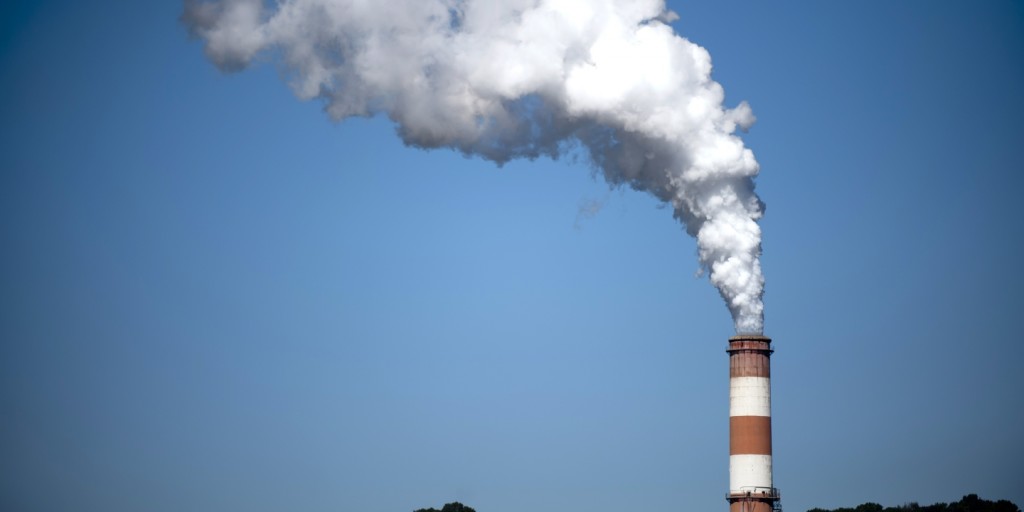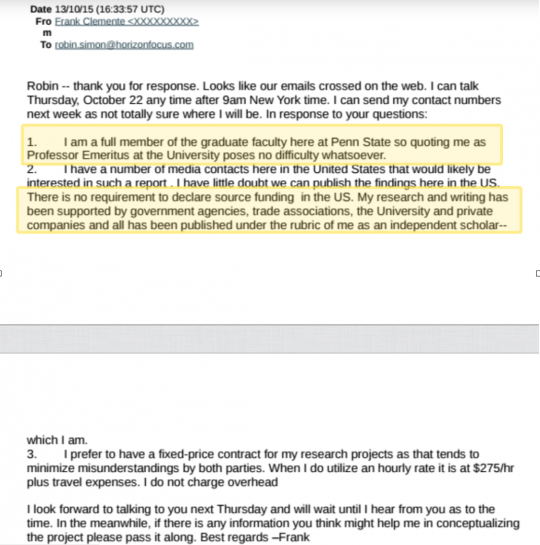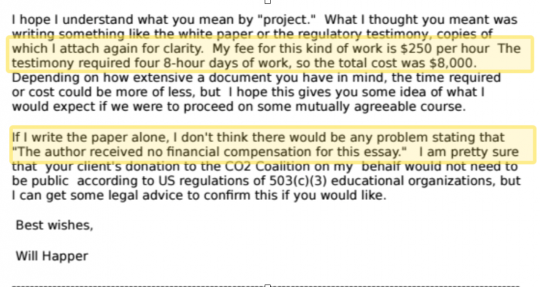In Greenpeace Sting, Professors Agree to Produce Research for Fossil Fuel Industry without Disclosure
IN FOCUS, 14 Dec 2015
9 Dec 2015 – “How much have you taken from Peabody Coal?”
That was the question Greenpeace researcher Jesse Coleman asked prominent climate change skeptic and Princeton physicist William Happer in a Senate hearing room Tuesday [8 Dec] afternoon, just as Happer was preparing to testify before Sen. Ted Cruz’s Commerce subcommittee.
Hours earlier, Happer had been exposed as one of the two victims of a sting in which Greenpeace researchers posed as consultants for the fossil fuel industry. They got Happer and a Pennsylvania State University professor to agree to accept funding to produce pro-industry research while concealing the source of that funding.
Happer was none too pleased with Coleman’s question.
“You son of a bitch, I haven’t taken a dime!” replied Happer. “I haven’t taken a dime, you son of a bitch.”
Watch the exchange:
httpv://www.youtube.com/watch?v=tULDE_gYmuc
In fact, in email exchanges he thought he was having with a business advisory firm based in Beirut, Happer had described his convoluted remuneration agreement with Peabody Coal: His fee, in return for his testimony at a regulatory hearing in Minnesota, was to go not directly to him, but to a nonprofit that paid some of his expenses.
The other sting victim was Frank Clemente, a professor emeritus of sociology at Penn State known for his pro-coal views. He received an email in which Greenpeace U.K. investigators Lawrence Carter and Maeve McClenaghan posed as a fixer for an Indonesian energy company. They asked him to produce a “briefing paper” to “counter damaging studies on Indonesian coal deaths, which have appeared in run up to Paris [climate talks].”
Clemente replied that he would be “very interested” in the project, noting that he had “worked with the Coal Industry Advisory Board, International Energy Agency, World Coal Association, the American Coal Council and the NCC, as well as a number of private coal-based companies and groups.”
Clemente explained that he could be cited using his academic title, that there was “no requirement to declare source funding in the U.S.,” and that all of his writing has “been published under the rubric of me as an independent scholar.”
Citing an hourly rate of $275, he sent over a paper he did for the International Energy Agency that he said cost them $50,000. An “8-10 page paper” would run $15,000. “My op/ed fee usually is $6,000 for 2-3 pages.”
He attached his testimony before the Tennessee Valley Authority and an op-ed about coal that was picked up by dozens of small publications. “Note that in none of these cases is the sponsor identified,” he boasted. “All my work is published as an independent scholar.”
In their dealings with Happer, the Greenpeace researchers posed as a “partner in a business advisory firm based in Beirut” advising an exploration and production firm.
They wrote that their client was “concerned about the impacts of the U.N. climate talks later this month” and wanted to “commission a briefing … which highlights the crucial role that oil and gas have to play in developing economies.”
Happer responded by attaching a white paper he helped write for the CO2 Coalition, a pro-carbon organization, as well as testimony at a regulatory hearing in Minnesota. “I would be glad to try to help if my views, outlined in the attachments, are in line with those of your client,” he said.
Happer explained that “whatever fee” they paid should “go directly to the CO2 Coalition. This was the arrangement I had with the attorneys representing the Peabody Coal Company in the regulatory hearings in Minnesota. The fee I would have received was sent instead to the CO2 Coalition, a 501(c)(3) tax exempt educational organization. The CO2 Coalition covers occasional travel expenses for me, but pays me no other fees or salary.”
Penn State and Princeton did not respond to requests for comment. Like many universities, Penn State explains on its website that it only requires public disclosure of conflicts of interest on research that receives certain kinds of federal research money.
____________________________
Zaid Jilani is a journalist who hails from Atlanta, Georgia. He has previously worked as a reporter-blogger for ThinkProgress, United Republic, the Progressive Change Campaign Committee, and Alternet. He graduated from the University of Georgia in 2009 with a Bachelor of Arts in international affairs and received his master’s in public administration from Syracuse University in 2014. ✉zaid.jilani@theintercept.com
Go to Original – theintercept.com
DISCLAIMER: The statements, views and opinions expressed in pieces republished here are solely those of the authors and do not necessarily represent those of TMS. In accordance with title 17 U.S.C. section 107, this material is distributed without profit to those who have expressed a prior interest in receiving the included information for research and educational purposes. TMS has no affiliation whatsoever with the originator of this article nor is TMS endorsed or sponsored by the originator. “GO TO ORIGINAL” links are provided as a convenience to our readers and allow for verification of authenticity. However, as originating pages are often updated by their originating host sites, the versions posted may not match the versions our readers view when clicking the “GO TO ORIGINAL” links. This site contains copyrighted material the use of which has not always been specifically authorized by the copyright owner. We are making such material available in our efforts to advance understanding of environmental, political, human rights, economic, democracy, scientific, and social justice issues, etc. We believe this constitutes a ‘fair use’ of any such copyrighted material as provided for in section 107 of the US Copyright Law. In accordance with Title 17 U.S.C. Section 107, the material on this site is distributed without profit to those who have expressed a prior interest in receiving the included information for research and educational purposes. For more information go to: http://www.law.cornell.edu/uscode/17/107.shtml. If you wish to use copyrighted material from this site for purposes of your own that go beyond ‘fair use’, you must obtain permission from the copyright owner.


